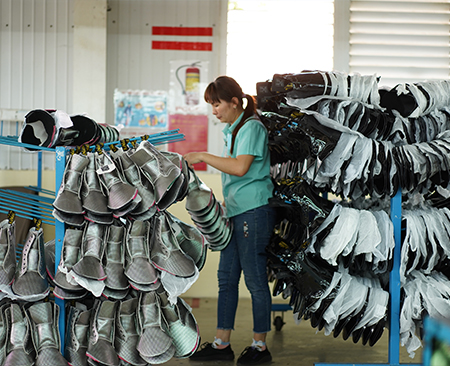We believe that everyone who works for Dr. Martens or wears our boots should be part of a community where they feel accepted and included.
We are committed to supporting our employees, the workers in our supply chain and our wider communities to thrive and empowered to express themselves.
Our people
Dr. Martens has long been committed to conducting business in an honest and ethical manner. We expect high standards from each other, and we adhere to the DOCtrine, our global employee Code of Conduct, which defines the way we do business. All employees must sign the DOCtrine which covers our standards and expectations of our employees on areas such as human rights and ethical trade, health and safety, anti-bribery, malpractice and harassment. Should there be a need to raise any concerns regarding the principles outlined in the Code of Conduct, we have a confidential whistleblowing hotline, Speak Up.
As part of our culture first approach, we have a range of initiatives and perks which support the mental, social, physical and financial wellbeing of our employees. Some of the initiatives offered include access to our Employee Assistance Programme (free and confidential advice service), learning and development programmes and an annual volunteering allowance.
Annual surveys and listening groups help create a picture of how our people engage with our brand, culture and the employee experience we provide. We are proud that our inclusive culture is reflected in the results, and more details can be found in our Annual Report.
Our global compliance and training platform ‘How We Do Business’ allows consistent and relevant policies and training materials to be distributed to all of our employees across all regions in relevant languages. It also provides live views and up to date reporting and monitoring of the business’ progress rate, therefore allowing targeted training and communication where needed.
Mandatory training for Dr. Martens employees include modules on Health & Safety, Financial Crime (including Anti-Bribery and Corruption) and Information Security. We also have additional training modules including DE&I, Harassment Prevention, and Human Rights. All employees are also required to read and adhere to the Business Code of Conduct (the DOCtrine) as well as attesting to other mandatory policies such as our Anti-Bribery and Corruption Policy.
Human rights are the foundation of a fair and thriving society. At Dr. Martens, we are deeply committed to upholding these values, ensuring that respecting our people is woven into everything we do. This commitment extends not only to our own employees but also to our global supply chain. We actively engage with our suppliers, raising awareness, fostering understanding and closely monitoring their practices to ensure that human rights are respected at every step.
Diversity, Equity & Inclusion

Diversity Equity & Inclusion (DE&I) is firmly on our agenda. It is a part of who we are as a business and as a brand. We have been on an important journey in how we evolve and continue to embed DE&I at Dr. Martens. Making sure that we are continuously improving our processes and investing in ongoing education for all. Redefining how we attract talent and creating spaces for discussion and movement around gender and race.
This is our DE&I strategy.
You can find our gender pay gap results here.
Our suppliers
We believe it is important to develop long-term partnerships with our suppliers and have worked with many of them for more than a decade. Our supplier conferences promote an environment of trust and transparency, whilst building a deeper understanding of the issues faced by our suppliers.
We have policies and procedures in place that our suppliers must adhere to. They set out our expectations and standards for our supplier interactions. These policies are embedded in our Master Supplier Agreements which are signed by our key suppliers.

Responsible purchasing practices are a necessity for responsible business and central to fostering strong supplier relationships. A positive buying relationship can result in reduced pressure on the supplier, which enables them to comply with supply chain policies on the rights of workers and working conditions.
We have developed a Responsible Purchasing Practices Charter which outlines how we endeavour to interact and treat our material, product and service suppliers, and reflects our belief in the importance of our supplier relationships:
|
Relationships |
We invest in our suppliers, and value long-term partnerships in which we can work together to improve mutual business performance. |
|
Payment Terms |
We operate to an agreed payment schedule. |
|
Planning |
We forecast and communicate our order requirements well ahead so that our suppliers can carefully plan for what they need. |
|
Fair Labour Costing |
We ensure legally compliant and competitive provision for wages and benefits. |
|
Training |
We will train all our relevant teams on what it means to purchase responsibly. |
|
Communications |
We value transparency and understand the importance of two-way, open and honest communication. |
|
Supplier Exit |
We will only undertake a supplier exit after full consideration and in a responsibly managed way. |
|
Sustainability |
We work with our suppliers to set clear expectations around sustainability, including human rights and environmental values and commitments. |
Our Supplier Code of Conduct sets out our expectations for the suppliers we work with across a number of principles. It is based on the Ethical Trade Initiative Base Code and conventions of the International Labour Organisation (ILO), such as no child labour or forced labour. This is our full Supplier Code of Conduct.
All our suppliers must comply to our Supplier Code of Conduct as a minimum standard:
- Employment must be freely chosen.
- Workers must have freedom of association and the right to collective bargaining.
- Working conditions must be safe and hygienic.
- Child labour must not be used.
- All wages must be paid on time and in full.
- Working hours must be not be excessive.
- Discrimination must not be practiced.
- Harsh or inhumane treatment must not be tolerated.
- Unauthorised subcontracting and homeworking is prohibited.
Our policy states suppliers should not employ anyone below the age of 15, unless local or national law stipulates a higher mandatory age. We expect our suppliers to have robust recruitment systems and policies to respect the minimum working age standards. However, this is still something that we monitor closely.
Health and safety management is an ongoing challenge for all of our suppliers and generally accounts for a high proportion of all issues identified by our monitoring programme. As such, we have worked with suppliers to implement robust procedures to manage health and safety. Dr. Martens’ local employees in each of our source countries attend regular health and safety meetings with all of our suppliers. We have developed and rolled out a number of tools to support this work, including a H&S Toolkit and PPE Guide as well as our Needle and Sharp Materials Policy.
As a business, we are committed to respecting human rights and identifying, investigating, engaging and remediating any issues related to modern slavery. We offer training to all of our employees on how to spot the signs of potential victims. You can find out more in our recent Modern Slavery Statement.
Our CSR teams are based in key sourcing locations, where they work directly with new and existing Tier 1 and Key Tier 2 suppliers and their factories. We have a robust factory approval process, which includes third party CSR audits, which must be completed before engagement with new suppliers. We also have an ongoing monitoring programme to frequently monitor (at least once a year) active Tier 1 suppliers compliance with labour and environmental laws, regulations, industry standards and our own policies. We have also expanded the CSR monitoring to Key Tier 2 suppliers. This programme is the foundation of our relationship with our suppliers, in order to maintain fair and safe working conditions and to protect the environment.
We partner with an independent third-party company to deliver our CSR monitoring programme. The Workplace Conditions Assessment (WCA) is an on-site verification programme intended as an overall risk assessment for social compliance issues across a range of topics from modern slavery, child labour, wages and hours, health and safety, environment, and management systems.
Annual audits are conducted on a semi-announced basis. Suppliers are given a window of 30 days during which the audit could take place. The frequency of follow-up audits is determined by each supplier’s audit rating and they are conducted on an announced basis.
If any non-conformances are identified, we work with the supplier to develop corrective action plans and then check that these have been implemented in practice. Should a supplier fail to remediate issues identified by an audit during an agreed timeframe, the supplier partnership may be terminated.
Community
Supporting communities around the world is part of who we are at Dr. Martens.
We have a history of supporting causes that work to advance social justice issues, including support for anti-racism causes, LGBTQIA+ rights, and mental health initiatives – all of which we know our people are passionate about. This impact is amplified through our efforts as a company, as well as by the Dr. Martens Foundation.

Volunteering
We value diversity and authenticity, so we support an array of local causes around the world, and we encourage our people to do the same too, through volunteering and matched giving. We support and encourage our people to use their annual two-day volunteering allowance to support their local community and the causes they feel most passionately about.



